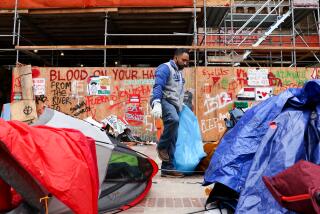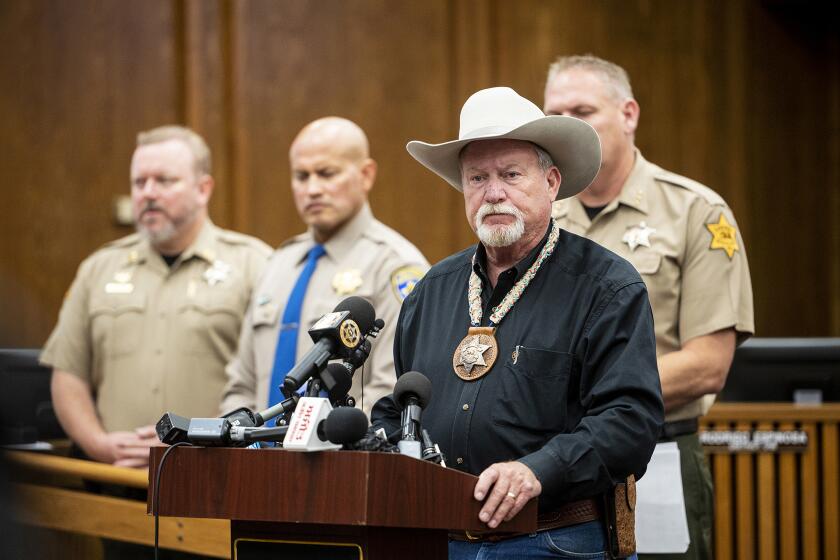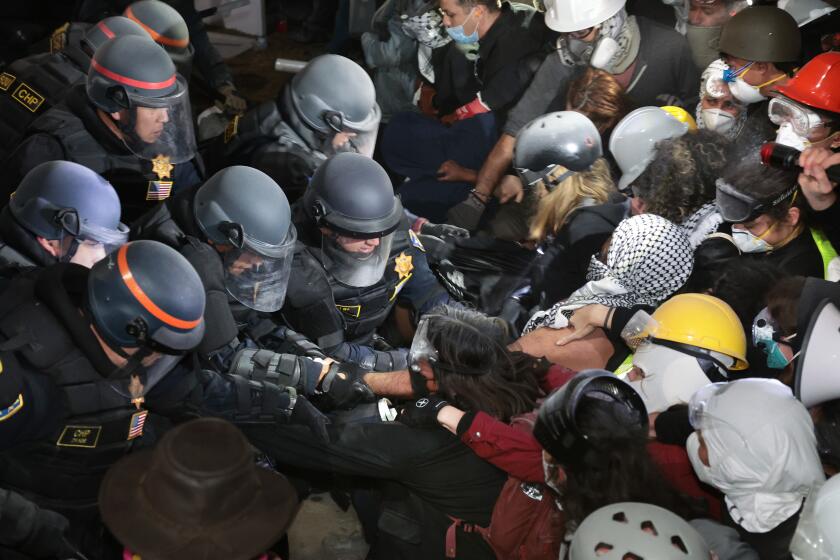‘Even Our Friends May Have Been Contaminated’ : Damages Asked for PCB Spill Near Backyard
The crew from the utility company quickly cleaned up the oily substance that spilled from a damaged transformer near the Huntington Beach home of Stanley and Chris Carlson seven years ago.
There was nothing to worry about, Carlson said a member of the crew told him. The substance in his backyard and garden was “just like mineral oil,” Carlson said he was told.
Five months later, Southern California Edison Co. workers in full protective gear swarmed over the Carlson backyard. The precautions were necessary, according to the utility, because the 55-gallon drums of soil--40 of them--removed by the workers had been contaminated with highly toxic PCB, a suspected carcinogen.
“It was very scary,” Carlson said. “One day they tell you it’s no problem; the next day they show up in protective clothing.”
Carlson’s lawsuit against the utility for emotional distress and property damage in connection with the PCB spill is scheduled to open today in Orange County Superior Court in Santa Ana.
Edison lawyers denied that the Carlsons were misled about the spill. They said workers did a thorough cleanup job once the hazard was recognized.
No Ill Effects Reported
Neither the Carlsons nor their young daughter have suffered any ill effects from the incident, the utility said.
“Our position is that they cannot prove they have taken in any PCBs as a result of this,” said Charles K. Collins, one of Edison’s attorneys. “Medical examinations have shown that their PCB levels, within their bodies, are no different from anybody else’s.”
On April 26, 1980, a transformer on a pole behind the Carlson’s home, near the wildlife refuge at Bolsa Chica State Beach, caught fire and exploded. Edison crews, wearing no unusual gear, cleaned up the oily substance, most of which had fallen on a street behind the Carlson’s yard.
Several days later, Carlson noticed an oily substance in his backyard. He called Edison--the first of many calls he said he placed to get some facts about the spill.
Carlson said he was always told his information would be passed to an “appropriate” official. For five months, he received no response, Carlson said.
Finally, Carlson said he was given an inside number at Edison from a city employee. When he called it, he said he was first chewed out for using the private line. But he had gotten through, and within days, one-third of his backyard had been dug up.
Carlson said he had never heard of PCB until shortly before he learned his yard had been contaminated.
PCB, or polychlorinated biphenyls, were widely used as insulation for electrical transformers, condensers and hydraulic systems. Their manufacture was barred in the United States in 1976 after they were determined to have caused cancer in rats.
The Environmental Protection Agency has classified the thick, colorless compound of chlorinated hydrocarbons as a probable human carcinogen. The chemical is also extremely slow to break down in the environment.
Federal rules require the phasing out of PCB, but millions of pounds of them remain in use in electrical equipment.
Carlson said the uncertainty is crushing. He and his wife have no idea if the effects of PCB will never show up, or show up only after many years.
Carlson said he worries that even friends may have been contaminated.
The PCB spilled over an area he used for a garden. He often shared the harvest with friends, but the fruits and vegetables were contaminated.
“They took fruit and soil samples,” Carlson said. “We had cantaloupe, raspberries, eggplant, onions. My recollection is that all of the samples they took for analysis showed some degree of contamination.”
The federal Centers for Disease Control in Atlanta has set a maximum safe level of PCB at 50 parts per million, according to Larry Bruce, attorney for the Carlsons. Readings as high as 37,000 ppm were taken from soil samples; Bruce said one raspberry leaf contained a reading of 13 ppm.
Because the presence of the PCB was not known, Bruce said the Carlsons were not alerted to watch the symptoms sometimes noted, such as headaches and a severe skin rash.
But lack of notice should not be the responsibility of the utility, Collins said: “We didn’t advise them one way or the other about a PCB spill on their property because we didn’t know there was a spill.”
For Edison, experts will testify that the panic over PCB in the late 1970s has been undercut by subsequent research. For instance, no research anywhere indicates that people can become contaminated through contaminated produce, Collins said.
“Part of the defense is that it has since been found that PCBs are not nearly as hazardous as they were first believed to be,” he said. “We cleaned up this spill to all appropriate levels. We cleaned it up to all safe levels.”
The Carlson lawsuit claims unspecified damages for emotional distress and property damages. Bruce said the distress claim in part stems from the “callous” treatment his clients received at the hands of the utility company.
Bruce said Edison company representatives took samples from carpets inside the Carlson home, but he said the utility has flatly refused to release the results.
“When they asked, ‘What about the carpets?’ the response was, ‘Go rent yourself a steam cleaner,’ ” Bruce said.
“When they asked about health effects, the response was, ‘Ask your own doctor,’ ” he said.
Stan Carlson, 39, a pharmacist, and his wife, Chris, also 39, who is studying engineering at UC Irvine, “agonized” over whether they could risk having children, Bruce said.
But a daughter, Jennifer, 5, looks fine, and shows no apparent injury, Bruce said.
As for their backyard, Carlson said he still mows the lawn, but other than that, no one uses it.
More to Read
Start your day right
Sign up for Essential California for news, features and recommendations from the L.A. Times and beyond in your inbox six days a week.
You may occasionally receive promotional content from the Los Angeles Times.






